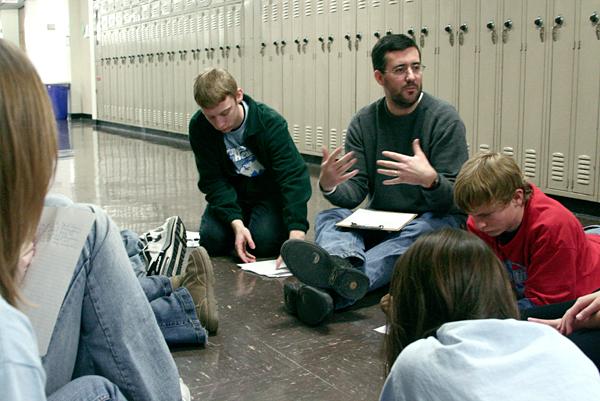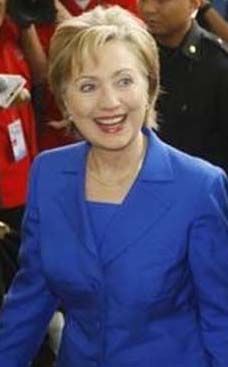
When Cone began teaching contemporary issues seven years ago, the curriculum consisted of issues such as gay marriage and junk food in schools. He chose this year to explain the complexities of AIDS to his students and challenge them to become active in finding practical solutions to the world’s health care scourges. “I want to give the students an authentic experience,” he said. “I want them to know that if they work hard, they can make a difference.” Cone’s parents met while working with the Peace Corps in Kenya and they exposed their son to many parts of the world. At 24 years old, he spent 11 months traveling throughout sub-Saharan Africa, the Middle East and Asia, and said he became frustrated with the unmet needs in the rest of the world. In bringing his story back to the U.S., he said he hoped others would feel unsatisfied and be compelled to action. “I thought about being a journalist, but I realized I could tell these stories in the classroom,” Cone said. “I feel like teaching is a kind of activism.”
Matt Cone’s parents met while working with the Peace Corps in Kenya and they exposed their son to many parts of the world
Rock Bridge teacher brings AIDS education to forefront of class
Friday, February 27, 2009 | 3:18 p.m. CST
Caption: Matt Cone, a social studies teacher at Rock Bridge High School, discusses the progress of his students’ charitable work as part of Partners in Health with, from left, Brandon Wilder, Erin Greer and Kirk Backus on Dec. 11. Cone has let the students pick charities to help instead of doing conventional classwork. They have responded by coming up with inventive and unconventional ways of activism, such as singing and dancing door-to-door. Photo: Mike Pittman
BY Amy Allen
COLUMBIA — It’s early December, and the wind has a bite to it. Rock Bridge High School seniors Kate Hunt and Brandon Wilder, both 18, hustle through the gusts from house to house, asking neighbors for donations of any amount. Under layers of fleece and wool, they wear matching powder blue T-shirts that read “Partners in Health,” which is a nonprofit organization that provides free health care to people in need all around the world.
Behaving more as activists than students, Hunt and Wilder are working on their final project for Matthew Cone’s contemporary issues class. They learned about the HIV/AIDS epidemic and related issues during the past few months and chose to complete a rigorous stint as activists rather than read and analyze a book.
“I’m not a fan of the term paper,” Cone said. “I would rather see the students do something.”
When Cone began teaching contemporary issues seven years ago, the curriculum consisted of issues such as gay marriage and junk food in schools. He chose this year to explain the complexities of AIDS to his students and challenge them to become active in finding practical solutions to the world’s health care scourges.
“I want to give the students an authentic experience,” he said. “I want them to know that if they work hard, they can make a difference.”
Cone’s parents met while working with the Peace Corps in Kenya and they exposed their son to many parts of the world. At 24 years old, he spent 11 months traveling throughout sub-Saharan Africa, the Middle East and Asia, and said he became frustrated with the unmet needs in the rest of the world. In bringing his story back to the U.S., he said he hoped others would feel unsatisfied and be compelled to action.
“I thought about being a journalist, but I realized I could tell these stories in the classroom,” Cone said. “I feel like teaching is a kind of activism.”
This will be Cone's eighth and final semester teaching at Rock Bridge. His wife, Anna Bardone-Cone, is a clinical psychology professor at MU and has taken a new position at the University of North Carolina-Chapel Hill. Cone said he hopes to find a job in the Chapel Hill area, ideally teaching a similar high school course.
Contemporary issues attracts a wide range of students. The course is a semester-long, non-honors, non-AP elective, but students say it is not a blow-off class.
“This class is harder than most other classes I have taken,” Hunt said. “It’s not an honors class, but it’s a lot of work.”
The course’s curriculum evolves with the world’s social climate. For the past few semesters, the first half of the class has encompassed the causes and effects of the AIDS epidemic. Throughout this unit, Cone brings insight and encouragement to the classroom from experts in various fields of activism.
Previous guests include former First Lady Laura Bush, former Secretary of State Colin Powell, and linguist and political activist Noam Chomsky. Some guests, such as Powell, talk to the class via speakerphone while others, such as Bush, appear in the class via video conference.
This semester, Jim Kim, a MacArthur Genius Award recipient, will appear via video conference. Other guests, who will address the class via speakerphone, include: John Wood, Room to Read founder; author and activist Dave Eggers; Oxford economics professor Paul Collier; Girls Educational and Mentoring Services founder Rachel Lloyd; and Paul Farmer and Ophelia Dahl of Partners in Health.
In September, Lisa F. Jackson, director of "The Greatest Silence," spoke to the class via speakerphone. Her documentary explores the use of sexual violence in the Democratic Republic of Congo's civil war. After explaining several obstacles to positive change in the country, Jackson pushed the students to think proactively.
“Come up with something to bring peace — a campaign worth waging," she said. "Change starts with people like you.”
Mitch Besser, founder and medical director of mothers2mothers, an organization that works to build support among HIV-positive women in the developing world, spoke to the class the following month.
Besser encouraged the students to dream big but to start building support locally. The idea, he said, is to work in small terms while thinking in grand terms.
“Engage people — get their attention,” he said. Students should engage people in conversation to urge them to help.
“People want to help but they don’t know how,” Besser said.
Cone based the final assignment for the HIV/AIDS unit on Besser’s idea of engaging with the public. Students created artwork to express their understanding of the epidemic. The pieces had to show how poverty leads to AIDS; why AIDS is an economic, military and political threat; and what can be done to combat the crisis. The class invited parents, friends and members of the public to an open conversation about AIDS, using the artwork as catalysts.
Hunt’s piece featured the war between underdeveloped nations and the AIDS epidemic as a series of ferocious battles among raccoons and bears.
“I wanted to draw something where two different animals would be fighting for the same kind of food, and raccoons and bears both go after trash,” she explained.
Hunt sketched raccoons struggling with chains to represent the obstacles of landlocked countries, raccoons wearing backpacks to show migration patterns associated with poverty and healthy raccoons holding hands to symbolize the positive effects of support groups.
“Not all of the infected areas that are doing better now have antiretroviral drugs, but they have that support, and they’re learning how to live and cope with having AIDS,” Hunt said.
At the end of the session, guests commented on the students’ capability to relate issues and explain complexities.
“It is clear that the students know the big picture,” said Ines Segert, a member of the Columbia School Board.
Upon beginning the health care inequalities unit, Cone requires his students to read "Mountains Beyond Mountains," a book about the work of Paul Farmer and his founding of Partners in Health. For the semester’s final project, students have the option of reading a book about Haitian history or working to raise money for Partners in Health.
“The second option is definitely harder,” Cone warned the class as they decided which route to take, “but many students say it’s the most rewarding thing they have done in school.”
Students who opt to raise money must create a thorough plan of action and must journal about their experiences. Since Cone first offered the fundraising option in 2004, students have hosted several events such as fashion shows and dance parties, sold merchandise and gone door-to-door asking for donations.
Cone stressed repeatedly at the project’s commencement that participating students cannot at any point tell him how much they have raised. He grades them on effort by reading the journals and visiting students while they work to raise money. However, he does urge students to set specific financial goals for themselves.
“I have run a couple of marathons, and I know that if you have a fixed goal, then you won’t quit,” Cone told the class.
The first year, students set the bar at $40 per student. This year’s goal was $1,000.
To raise the money, this semester’s students raffled an iPod nano, went door-to-door and raised money to compel a few male teachers to appear in dresses. Along the way, Cone pushed the students to be creative yet pragmatic about how to spend their time.
“Be really critical – will people in Haiti benefit from what you’re doing with your time?” he asked them.
Cone remarked on the students’ honest self-evaluations. He said some embrace new confidence in their ability to make progress, while others grapple with who they are and how far they are willing to go to pursue ideals.
“I think that analysis is really helpful,” he said. “It’s an important skill to have.”
After finishing the semester, Wilder said he learned a great deal about organizing plans and getting people motivated. As a whole, he said the class was one of the most worthwhile he has taken.
“We worked to make drastic changes in people’s lives,” Wilder said. “That’ll definitely stick with me.”
The class’s influential content, inspiring speakers and ecstatic instructor have pushed some students’ paths in the direction of international aid.
Hunt hopes to work toward a pre-med degree that will allow her to work in health care abroad.
“I’ve thought about the Peace Corps,” she said. “And one of the colleges I’m applying to has a program for pre-med students in Tanzania. I would really like to do something like that.”
Bram Sable-Smith is a freshman at Washington University in St. Louis and former member of Cone’s contemporary issues class. After graduating from Rock Bridge, he spent two years in Swaziland, South Africa, as an International Baccalaureate student with United World Colleges. While studying, he also worked with a group of social workers to keep children educated and off the streets. He attributes his opportunities abroad to an extra credit assignment that Cone offered him to watch a documentary about the Rwandan genocide.
“Mr. Cone had set the bait with me just as he’s done with so many other students who take his classes,” Sable-Smith said of the assignment. “Suddenly I cared.”
When he took contemporary issues in 2005, the class focused on the United States’ occupation in Iraq, and Cone brought in varied voices and engaged them in discussion. Sable-Smith said he appreciated the complete array of opinions that his teacher presented.
“In high school, you’re at that point of discovering who you are, and I feel like Mr. Cone is working to make us a globally conscious generation,” he said.












